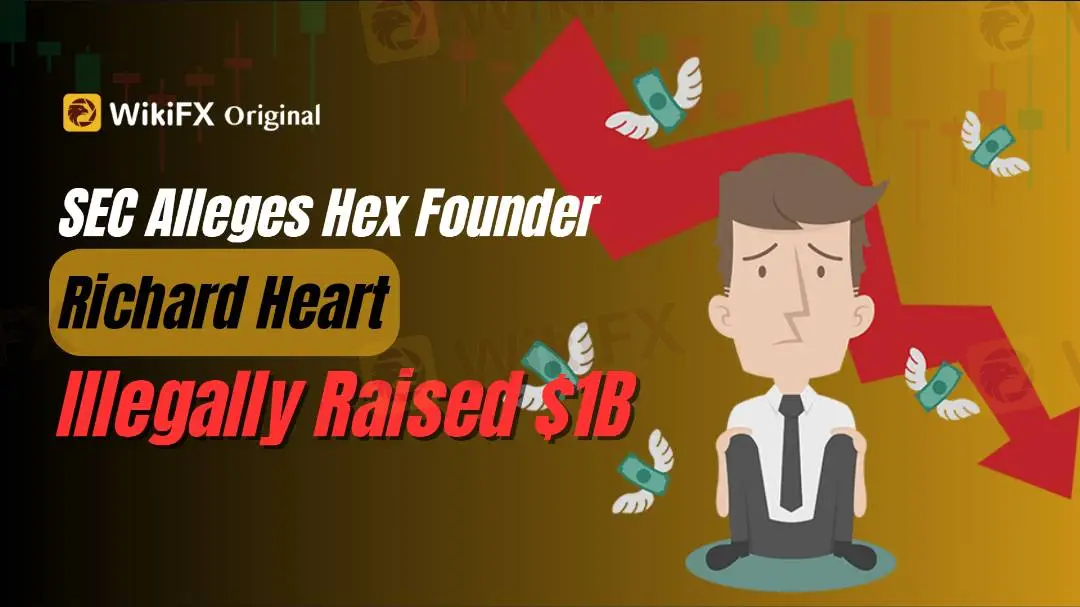简体中文
繁體中文
English
Pусский
日本語
ภาษาไทย
Tiếng Việt
Bahasa Indonesia
Español
हिन्दी
Filippiiniläinen
Français
Deutsch
Português
Türkçe
한국어
العربية
SEC Alleges Hex Founder Richard Heart Illegally Raised $1B, Misappropriated $12M
Abstract:Allegations have surfaced against Richard Heart and his affiliated companies, accusing them of embezzling $12 million of investor funds. The U.S. Securities and Exchange Commission (SEC) has recently taken legal action against major cryptocurrency exchanges Binance and Coinbase, alleging illegal operations.

As part of its recent efforts to regulate crypto exchanges in the United States, the Securities and Exchange Commission (SEC) has accused Richard Heart, also known as Richard Schueler, the Founder of Hex, of conducting unregistered offerings of crypto asset securities and raising more than $1 billion. The charges were filed by the SEC in a district court in New York.

SEC Alleges Misappropriation

As per the SEC, Richard Heart raised the funds through Hex, which he promoted as providing the first high-yield 'blockchain certificate of deposit', beginning in 2018. Additionally, he purportedly acquired funds for the development of PulseChain, a crypto asset network, and PulseX, the corresponding crypto asset trading platform.
The SEC further asserted that all three entities, Hex, PulseChain, and PulseX, are unincorporated and under Richard Heart's control. Through these entities, the Hex Founder allegedly offered investors the opportunity to exchange their digital assets for PLS and PLSX, the native tokens of PulseChain and PulseX, respectively.
According to the SEC statement, from December 2019 to November 2020, Richard Heart and Hex conducted an unregistered offering of Hex tokens, resulting in the collection of over 2.3 million Ethereum (ETH). The SEC further noted that Heart utilized “recycling” transactions to gain control of additional Hex tokens without disclosure. Additionally, the complaint alleges that between July 2021 and March 2022, Heart organized two more unregistered crypto asset security offerings, raising hundreds of millions of dollars in crypto assets.
In addition, the SEC accused Richard Heart and PulseChain of misappropriating a minimum of $12 million from investor funds. According to the SEC, Heart reportedly used this money to indulge in luxury items such as sports cars, watches, and notably, the acquisition of a 555-carat black diamond known as “The Enigma” – purportedly the largest black diamond globally.

Furthermore, the SEC asserted that Richard Heart developed and promoted a 'staking' feature for Hex tokens, promising potential returns of up to 38%. In an alleged effort to circumvent U.S. securities law, Heart reportedly urged investors to 'sacrifice' their crypto assets instead of 'investing' them in exchange for PLS and PLSX.
Eric Werner, the Director of the SEC's Fort Worth Regional Office, stated in the official statement that the SEC's action aims to safeguard the investing public and hold Heart accountable for his actions.
War against Crypto Exchanges
The SEC's action against Richard Heart and his companies comes amidst the regulator's ongoing legal battles with major players in the cryptocurrency industry, including Binance, the world's largest crypto exchange, and Coinbase, the largest digital asset trading platform in the United States. The SEC has accused both platforms of operating as unregistered entities and offering crypto asset securities. Additionally, the SEC alleged that Binance mixed clients' funds with company resources.
However, in a recent development, Ripple, a digital asset firm, achieved a partial victory against the SEC when a U.S. court ruled that the sale of XRP tokens to retail investors on public exchanges did not violate the country's securities law.

Disclaimer:
The views in this article only represent the author's personal views, and do not constitute investment advice on this platform. This platform does not guarantee the accuracy, completeness and timeliness of the information in the article, and will not be liable for any loss caused by the use of or reliance on the information in the article.
Read more

How Crypto Trading Transforms FX and CFD Brokerage Industry
Explore how crypto trading reshapes FX and CFD brokerage with innovative products, liquidity solutions, and regulations in 2025.

Why More People Are Trading Online Today?
Discover why online trading is booming with tech, AI, and a push for financial freedom. From stocks to crypto, it’s a thrilling hustle for all.

SEC Ends Crypto.com Probe, No Action Taken by Regulator
The SEC has closed its investigation into Crypto.com with no action taken. Crypto.com celebrates regulatory clarity and renewed momentum for the crypto industry.

Interactive Brokers Expands Crypto Trading with Solana, XRP, Cardano, and Dogecoin
Interactive Brokers adds Solana, XRP, Cardano, and Dogecoin to its platform, enabling U.S. and U.K. clients to trade crypto 24/7 with low fees.
WikiFX Broker
Latest News
How Crypto Trading Transforms FX and CFD Brokerage Industry
UK would not hesitate to retaliate against US tariffs - No 10 sources
FCA Warns Against 10 Unlicensed or Clone Firms
CySEC Warns Against 14 Unlicensed Investment Websites
Top Currency Pairs to Watch for Profit This Week - March 31, 2025
Will natural disasters have an impact on the forex market?
Philippines Deports 29 Indonesians Linked to Online Scam Syndicate in Manila
Navigating the Intersection of Forex Markets, AI Technology, and Fintech
Exposed: Deceptive World of Fake Trading Gurus – Don’t Get Fooled!
AI-Powered Strategies to Improve Profits in Forex Trading
Currency Calculator







